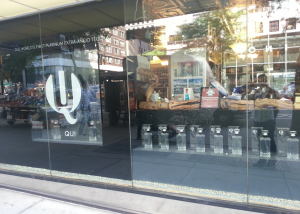From Law To Liquor: How One Corporate Attorney Left Law To Start A Luxury Tequila Company
This post originally appeared on Forbes.com.
Over the past few months I’ve heard the same brutally refreshing remarks from a handful of friends: They all want to quit their job as a lawyer so that they can pursue a business of their own. As one corporate lawyer friend put it, “it’s rewarding to help my clients with their business but I think it would be entirely more satisfying if it were a business of my own.”
This is one of the reasons a new tequila company called Qui Tequila was launched. Pete Girgis, a once corporate attorney, felt the same way and decided to leave his corporate gig so that he could launch a tequila company. Pete put it this way.
“I was at a big firm where I felt like a cog in the wheel. There wasn’t a sense of creation. Growing up, my father was a small business owner who owned liquor stores that I managed while in school. I had a passion for the spirits business and was lucky to have met my cofounders while practicing law. We are like brothers. We saw a great opportunity in the luxury tequila market. Now every time I walk into a bar or restaurant and see someone enjoying Qui, it is incredibly satisfying.”
Pete’s leap of faith to start his own business is now paying off. His tequila is now carried by dozens of liquor stores like Sherry-Lehmann, Bottlerocket Wine & Spirits, Park Ave Liquor Shop, Chelsea Wine Vault and prestigious hospitality venues like the Bowery Hotel, the Standard, Lure Fishbar, Casa La Femme, Darby, 1OAK, the General, and La Cenita.
Although hard work and hustle are two key ingredients to Pete’s success, he was able to share some more tips for future x-lawyers and aspiring entrepreneurs.
Education Matters. Although he doesn’t practice law anymore, Pete’s academic background as a JD/MBA provided him with critical building blocks to build his business.
“If I had to do it over, I would have still studied law and business. Starting a successful business is incredibly challenging and big businesses can have lots of complexities. I’m a firm believer that a strong foundation in the business and the legal worlds only helps your likelihood of success.”
Create a unique product. Pete and his team spent a lot of time meticulously developing a product that they would be proud of and the once lawyer is now a full blown tequila connoisseur.
“On the product side, Qui is the first Platinum Extra-Añejo Tequila in the world. So after the tequila is made, it rests in French Bordeaux and American Whiskey barrels for three and a half years. This aging process gives it a rich flavor, character and beautiful aroma. Then we filter it 9 times and distill it a third time for an incredibly smooth finish. No one has done that before and as a result, we just won Gold in the Spirits of the Americas Competition.”
Have a good distribution strategy. In the world of liquors and spirits, it is incredibly difficult to stand out. Pete and his partners figured they could create a unique product and distribute it in a competitive landscape by targeting specific market segments.
“We knew that New York was one of the most challenging spirits markets in the world, but if we could win here, we could go anywhere. We set out to create a brand that was more elegant, sophisticated and cosmopolitan then the rest with a juice that was equally as refined. So far, Qui has had great traction in the fashion, film, music and art worlds because of our focus on strong product-market fit and distribution.”
So if you are thinking about leaving your corporate job to start your own business, just remember that hard work, hustle and good planning can pay off. And then maybe you too will see your product in a nice window display like the one above.














